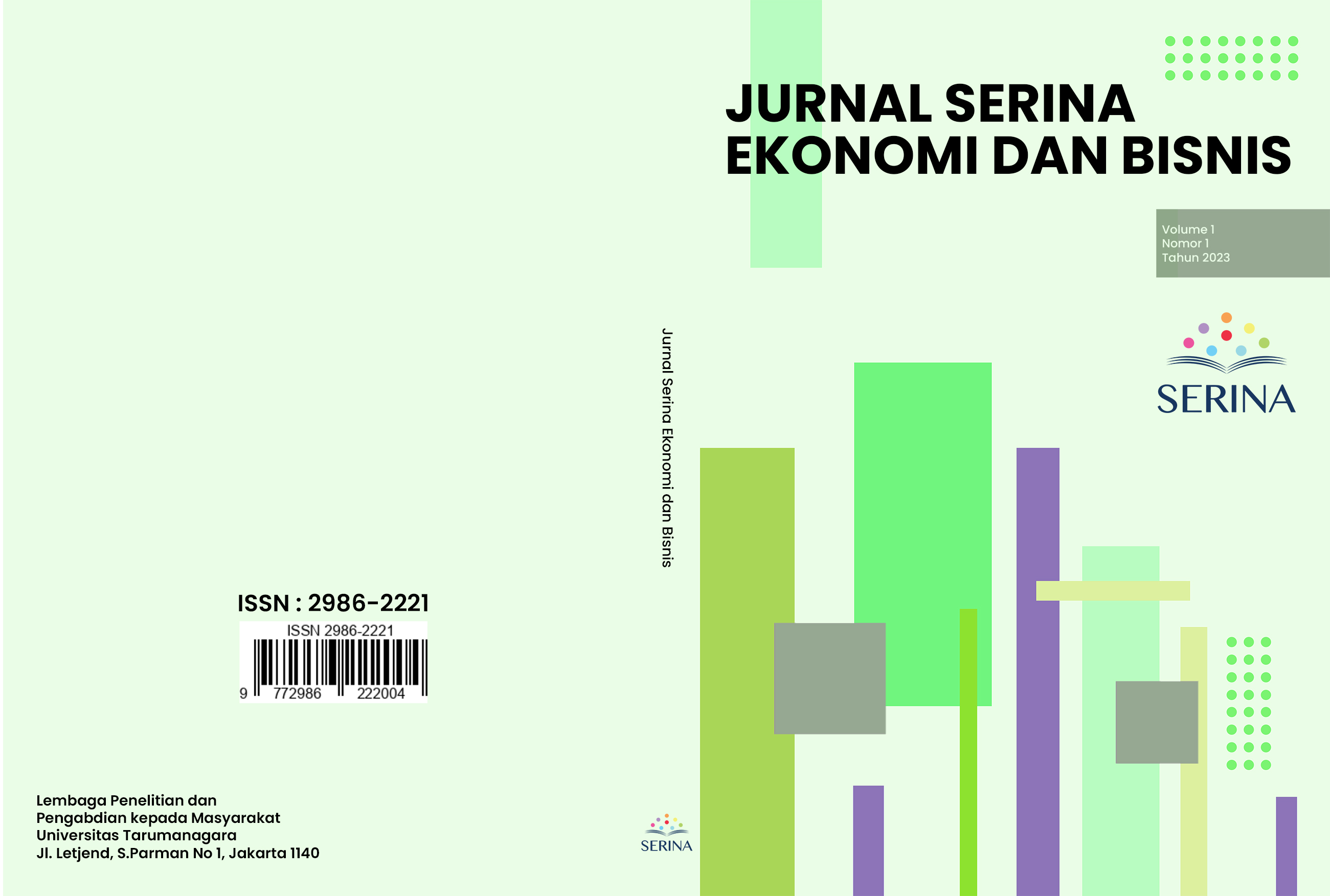PERAN LITERASI KEUANGAN DAN PERKEMBANGAN TEKNOLOGI FINANSIAL TERHADAP MINAT BERINVESTASI PADA MASA PANDEMI COVID19
Main Article Content
Abstract
This study aims to analyze the relationship between the use of financial technology and financial literacy on
the interest of millennial and generation Z investors in investing in the capital market. The analysis was
carried out on 150 respondents with the sample selection method using convenience sampling, namely the
ages of 10 to 30 years or millennials and generation Z in Indonesia. The hypothesis testing technique uses
the multiple linear regression Ordinary Least Square (OLS) method. This research concludes that financial
technology (fintech) does not influence investment intentions, while financial literacy influences investment
intentions.
Article Details
Section

This work is licensed under a Creative Commons Attribution-NonCommercial-ShareAlike 4.0 International License.
References
Abdeldayem, M. M. (2016). Is there a relationship between financial literacy and
investment decisions in the kingdom of bahrain? Uct Journal of Management and
Accounting Studies, 4(2), 68–78.
Aisa, N. N. (2022). Do financial literacy and technology affect intention to invest in the
capital market in the early pandemic period? Journal of Accounting and
Investment, 23(1), 49–65.
Das, K. K., & Ali, S. (2020). The role of digital technologies on growth of mutual funds
industry: An empirical study. International Journal of Research in Business and
Social Science (2147-4478), 9(2), 171–176.
Financial Stability Board. (2017). Financial stability implications from fintech:
Supervisory and regulatory issues that merit authorities’ attention. Basel.
Fitriarianti, B. (2018). Pengaruh literasi keuangan, perilaku keuangan dan pendapatan
terhadap keputusan berinvestasi. Proseding Seminar Nasional Akuntansi, 1(1).
Indonesia Central Securities Depository. (2022). Statistik pasar modal Indonesia. KSEI.
https://www.ksei.co.id/files/Statistik_Publik_April_2021.pdf
Junianto, Y., Kohardinata, C., & Silaswara, D. (2020). Financial literacy effect and fintech
in investment decision making. Primanomics: Jurnal Ekonomi & Bisnis, 18(3),
–168.
Karatri, R. H., Faidah, F., & Lailyah, N. (2021). Determinan minat generasi milenial
dalam investasi pasar modal di masa pandemi covid-19. Jurnal Ilmiah Manajemen
Dan Bisnis, 6(2), 35–52.
Kumari, D. A. T. (2020). The impact of financial literacy on investment decisions: with
special reference to undergraduates in western province, Sri Lanka. Asian Journal
of Contemporary Education, 4(2), 110–126.
https://doi.org/10.18488/journal.137.2020.42.110.126
Normalasari, N., Maslichah, M., & Sudaryanti, D. (2022). The effect of financial
behavior, financial literacy and demographic factor on students’ investment
decision making. Jurnal Ilmiah Riset Akuntansi, 11(2), 53–61.
Bongomin, G. O. C., Ntayi, J. M., Munene, J. C., & Nabeta, I. N. (2016). Social capital:
Mediator of financial literacy and financial inclusion in rural Uganda. Review of
International Business and Strategy, 26(2), 291–312.
https://doi.org/10.1108/RIBS-06-2014-0072
Otoritas Jasa Keuangan. (2020). Survei nasional literasi dan inklusi keuangan 2019. OJK.
https://www.ojk.go.id/id/berita-dan-kegiatan/publikasi/Pages/Survei-Nasional-Lite
rasi-dan-Inklusi-Keuangan-2019.aspx
Purnamasari, V., Merlinda, S., Narmaditya, B. S., & Irwansyah, M. R. (2021). The
millennial’s investment decisions: Implications of financial literacy, motivation,
and digitalization. Ekuitas: Jurnal Pendidikan Ekonomi, 9(2), 314–320.
Saputra, R. F., Suyanto, S., & Japlani, A. (2021). Pengaruh literasi keuangan terhadap
minat berinvestasi di pasar modal dengan perkembangan teknologi digital sebagai
variabel moderasi (Studi empiris mahasiswa akuntansi universitas muhammadiyah
metro). Jurnal Akuntansi AKTIVA, 2(2), 196–203.
Suprihati, S., & Pardanawati, S. L. (2020). The influence of knowledge, investment
motivation and investment understanding on student interest to invest in the
capital market. International Journal of Economics, Business and Accounting
Research (IJEBAR), 4(4), 1030–1038.
Suresh, G. (2021). Impact of financial literacy and behavioural biases on investment
decision-making. FIIB Business Review, 23197145211035480.
Taufiqoh, E., Diana, N., & Junaidi, J. (2019). Pengaruh norma subjektif, motivasi
investasi, pengetahuan investasi, persepsi return dan literasi keuangan terhadap
minat mahasiswa berinvestasi saham di pasar modal (Studi empiris pada
mahasiswa akuntansi feb unisma dan unibraw di malang). Jurnal Ilmiah Riset
Akuntansi, 8(05), 9–19.
Wahyudi, W., Tukan, B. A. P., & Pinem, D. (2020). Analysis of the effect of financial
literation, financial technology, income, and locus of control on lecturer financial
behavior. AFEBI Management and Business Review, 5(1), 37–46.
Wi, P., & Anggraeni, D. (2020). Faktor-faktor yang mempengaruhi minat karyawan
perusahaan untuk berinvestasi di pasar modal pada masa pandemi covid 19.
Jurnal Revenue: Jurnal Ilmiah Ilmu Akuntansi, 1(1), 81–89.
Yusuf, M. (2019). Pengaruh kemajuan teknologi dan pengetahuan terhadap minat
generasi milenial dalam berinvestasi di pasar modal. Jurnal Dinamika Manajemen
Dan Bisnis, 2(2), 86–94.

